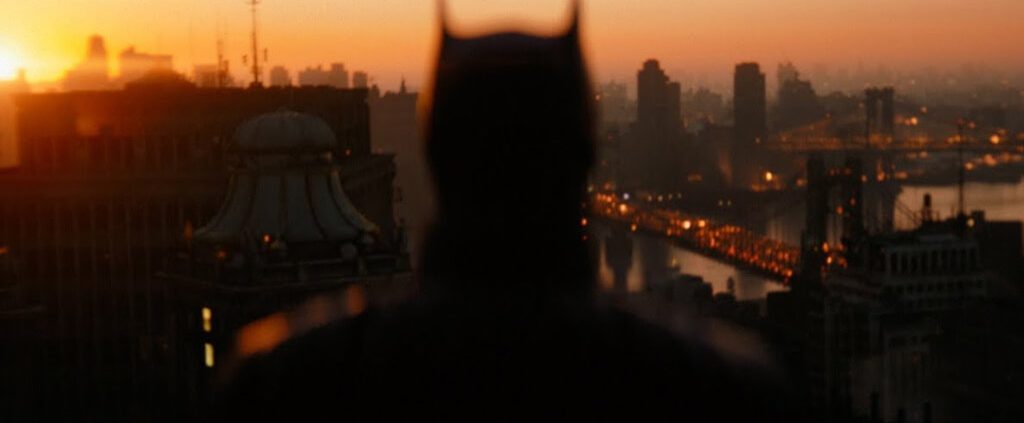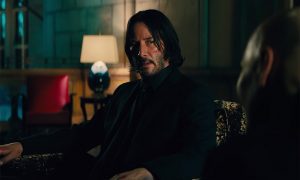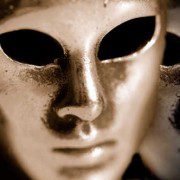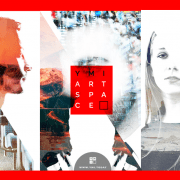The Batman and the Challenge to Be More
Screenshots taken from Youtube
Written by Simon Moetara
Editor’s note: Minor spoilers ahead
Early in his crime-fighting career, the Batman must battle dark and violent forces in Gotham City, while also confronting his own inner darkness–a darkness that threatens to consume him. . .
We last saw Batman (as portrayed by Ben Affleck) on the big screen in Justice League in 2017 (or, for the hardier movie-goer, in the four-hour Snyder-cut released in 2021). Now, this latest iteration, The Batman, takes us to an alternate “Earth-2” reality, a universe where we find a younger Bruce Wayne (Robert Pattinson) in only his second year as the caped crusader.
A masked serial killer known as the Riddler (a creepy, unsettling Paul Dano) starts murdering high-profile targets in Gotham City. Standing firmly in the comic’s reputation as the World’s Greatest Detective, and with the support of Lieutenant Jim Gordon (played with good-guy gravitas by the exceptional Jeffrey Wright) and the courageous cat burglar Selina Kyle (Zoë Kravitz), we see Batman/Wayne attempting to follow the clues and solve the riddles in order to avert impending disaster, while also grappling with his own torment and family legacy.

There’s a lot to appreciate in this version of the Batman tale: a broody Bats, a squalid Gotham bathed in neon with a neo-noir vibe, a souped-up muscle car Batmobile that wouldn’t be amiss in Mad Max: Fury Road, and a stirring and moody Giacchino score that stays with you long after the film ends.

However, amidst the shadows and corruption of this neo-noir mystery are challenging themes for us in a world which is increasingly enraged and struggling with hopelessness and a bleak future . . .
A hero hungry for vengeance
Pattinson’s portrayal of Bruce Wayne is a long way from the billionaire playboy of previous iterations. As Empire reviewer John Nugent declares, “This is emo-Bats.” He is still traumatised by his parents’ murders. Brooding, socially awkward, racked with insecurity, and deeply disillusioned, he hides away from human society in the Gothic heights of Wayne Manor.
Director Matt Reeves described the Bruce Wayne of The Batman as “an emotionally stunted 10-year-old.” We see him whining to Alfred, tossing verbal barbs one might expect from an ungrateful and gloomy teen.
But he’s different when he dons the suit and cape—a terrifying and menacing figure, muscular and violent, brutal and unyielding. In an early altercation, an opponent asks who this masked man is “supposed to be.” We expect the iconic line, “I’m Batman.” However, after brutally pummeling said bad guy, Batman gravelly intones, “I’m vengeance.”

And this is where we’re introduced to this reality’s Batman: not a protector or saviour of the vulnerable, but a terrifying vigilante that rules the night by fear. After dispatching the bad guys, the rescued victim whimpers, “Please don’t hurt me.” This cowering citizen doesn’t see a hero, but a nightmare.
Civilians are terrified of him. Cops disdain him as a ‘psycho.’ His violence is explosive, his use of force excessive. And he watches over Gotham’s nights, seeking to act out his vengeance in a city that might easily qualify for one of Dante’s infernal circles.

Is vengeance the answer?
For director Reeves, Batman’s early identification as vengeance incarnate sets up the character’s growth arc, through which he must realise that he has to rise above his desire for revenge. His craving for retribution doesn’t help the city; it’s a purely personal, self-serving vendetta that appeases his own inner rage. Reeves states:
. . . I’d like to see him have an awakening over the course of the story, so he starts to understand that he has to be more, that he has to change, that it’s not enough to take this path of vengeance…

While revenge is a theme that makes for exciting and satisfying storytelling on the big screen, and may even be one that many of us who identify with or have fantasised about it’s not an option for us as Christians. In Scripture the apostle Paul writes, “Dear friends, never take revenge. Leave that to the righteous anger of God” (Rom 12:19 NLT). In the same way, Pastor John Piper encourages us, “The promise that frees us from an unforgiving, bitter, vengeful spirit is the promise that God will settle our accounts.”
The thirst for vengeance is toxic and will poison our spirits. Instead, we are called to embrace the way of forgiveness and love, trusting that God will deal with these wrongs.
American writer Meredith Houston Carr believes that the best revenge isn’t success or getting even, but redemption. And that’s the question Wayne/Batman faces as finds himself at a crossroads: Will he walk the high road of redemption and rise above his personal pain to find the hero within? Or will he let darkness consume him, embracing his passion for vengeance?
“I have to become more”
Wayne is a disconnected and damaged person, a tragic figure. However, we see the loving constancy of Alfred, the integrity of Jim Gordon, and the empathy of Selina Kyle slowly humanising him, drawing him out of his insular and tortured brooding back into a world of human connection and concern.

At one stage the young Wayne heir comes across his father’s words and begins to rethink his role in the world: “Giving back is not just an obligation. It’s a passion. That is our legacy.” His father’s words strike a chord.
A confrontation with a villain challenges his mindset further, with Wayne/Batman declaring in voiceover: “Vengeance won’t change the past. Mine or anyone else’s. I have to become more. People need hope.” As we hear these words spoken, a citizen he’s rescued reaches out for him, not wanting to let go, feeling safe in his presence. Batman stands in the light of day, no longer hiding in shadows. He has rejoined the world of humanity, ready to give back and to walk the hero’s path.
Wayne finally recognises that stomping around cracking heads isn’t helping Gotham. If he’s going to be a hero, he needs to restore hope to a wounded people. His emphasis shifts from an inward, self-absorbed focus on his own fury and grief to a concern for those suffering around him.
This echoes the apostle Paul’s call for the Galatian Christians to live in freedom—not to use it to indulge their sinful nature, but rather “to serve one another in love” (Gal 5:13).
As followers of Christ, we ought to grow in others-centeredness. Pastor Jim Putman notes that the Holy Spirit transforms the disciple’s heart as we mature to reflect Jesus in a greater way:
- We move from self-centered to others-centered
- We become God-centered in motivation
- We have the desire to serve and lead
The redemptive arc of our personal story sees us looking outward in love, sharing the love that God has for us with others, seeking to serve others.
With God’s help, we, too, are becoming more—more than our past, more than the labels forced on us and the destructive words spoken over our lives, more than the mould into which this world would force us. Beneath the altering hand of the Holy Spirit (Gal 5:16-25), you and I are becoming more like Christ, more the men and women He longs for us to be. And that’s how we can be salt and light in a world desperate for the love and hope found in Christ (Matt 5:13-16)













Leave a Reply
Want to join the discussion?Feel free to contribute!